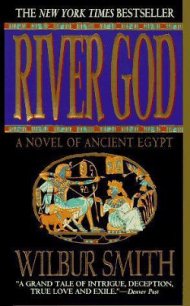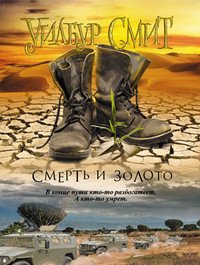Men of Men - Smith Wilbur (онлайн книга без txt) 📗
Ranked beside this formidable array were all the published lives of Alexander, of Julius Caesar and of Napoleon. What dreams of empire they must sustain. Zouga smiled inwardly as he listened to the high hypnotic voice of the burly figure with the flushed swollen face as he sat behind the vast desk into whose panels were chiselled the stylized figures of the bird, the falcon of Zimbabwe.
"You are an Englishman, Ballantyne, a man of honour and dedication; these things have always attracted me to you." He was irresistible, able to conjure up a gamut of emotions with a few words, and Zouga smiled at himself again. He was in danger of the same hero worship as his own son.
"I want you even more than this concession of yours.
You understand, you know what it is we seek, not merely wealth and personal aggrandizement. No, no, it is something beyond that, something sacred."
Then he came to it abruptly, without flourish.
"There," Rhodes said. "You know what I need, you and your concession. What do you want from me in return?"
"What task will I perform?" Zouga asked.
"Good." Rhodes nodded the untidy leonine head. "Glory before gold. You please me, Ballantyne, but to business.
I had thought to ask you to lead the occupying expedition, to guide it over the ground you know so well but other men can do something as simple as that. I shall let Selous do it. I have something more important for you. You will be my alter-ego at the kraal of the Matabele king. The savages know and respect you, you speak their language, know their customs, you are a soldier, I have read your military paper on the tribe, and we must not deceive ourselves, Ballantyne, it may come to a military option. Few other men can do all these things, have all these qualities."
They stared at each other across the desk, both men leaning forward, and then Rhodes spoke again.
"I am not a mean man, Ballantyne. Do the job for me and you can name your rewards. Money, ten thousand pounds, land, each land grant will be four thousand acres, gold claims, each will be five hundred yards square. How many shall we say, five of each, ten thousand pounds in cash, twenty thousand acres of prime land of your choice, five claims on the rich gold reef over which you shot the great elephant that you described in Hunter's Odyssey. What do you say, Ballantyne?"
"Ten of each," said Zouga. "Ten thousand pounds, ten land grants, ten gold claims."
"Done!" Rhodes slapped the desk. Write it down, Jordan, write it down. But what of your salary while you are agent at Lobengula's kraal? Two thousand, four thousand per annum? I am not a mean man, Ballantyne."
"And I am not a greedy one."
"Four thousand, then, and we are all agreed, so we can go to lunch."
Zouga stayed five days at Groote Schuur, days of talking and planning and listening.
It amused him to see the legend dispelled. The idea of Rhodes as a solitary and brooding man, withdrawn to some high Olympus where other men could not follow, was proved to be a myth.
For Rhodes surrounded himself with men; there was not a meal at which less than fifteen sat to his generous board. What men they were, clever or rich or both, belted earls or farm-born Boers, politicians and financiers, judges and soldiers. And if they were not wealthy, they were powerful or useful or merely amusing. At one dinner there was even a poet, a bespectacled little shrimp of a man on passage from Indian Service back to England.
Jordan had read his Plain Tales from the Hills and secured an invitation for him, and despite his appearance, the company was quite taken with him. Rhodes invited him to return and write about Africa: "The future is here, young Kipling, and we shall need a poet to sing it for us."
Men by the dozen, and never a woman. Rhodes refused to have a woman servant in the house. There was not even a painting of a woman on the walls.
And the taciturn, brooding figure of legend never stopped talking.
From the back of a horse as they rode through the estate, striding over the lawns with his clumsy uncoordinated gait, seated behind the teak desk or at the head of the long, laden dining-table, he talked.
Figures and facts and estimates poured from him without reference to notes, other than an occasional glance at Jordan for confirmation. Then came the ideas, fateful, ludicrous, prophetic, fascinating or fantastic, but neverending.
To a visiting member of the British Parliament: "We have to make a practical tie with the old country, for future generations will be born beyond its shores; it must be useful, physical and rewarding for both, or we shall drift apart."
To an American senator: "We could hold Parliament for five years in Westminster and for the next five in Washington."
To a rival financier who enviously sniped at his monopoly of the diamond industry: "Without me, the price of diamonds would not make it worthwhile turning over a stone to pick one up. Kimberley would revert to desert and thirty thousand would starve."
When they began to plan the grand expedition to the north, Zouga had imagined that Rhodes would concern himself with each detail. He was wrong.
He defined the objective: "We need a document from Lobengula, ratifying and consolidating all these grants into a single concession, that I can take to London." Then he picked the man. "Rudd, you have the legal mind." And gave him carte blanche. "Go and do it. Take Jordan with you. He speaks the language. Take anyone else you need."
Then to Zouga: "We need an occupying force, small enough to move fast, large enough to protect itself against Matabele treachery. Ballantyne, that will be your first concern. Let me know what you decide, but remember there is little time."
What might have taken another man six months, was accomplished in five days, and when Zouga left Groote Schuur, Jordan rode with him as far as the neck of the mountain. The wind had gone up into the north-west, and then came down like a ravenous beast, roaring dully against the crags of the mountain and bringing in cold, steely-grey rain squalls off the Atlantic.
It could not blunt their spirits, and although their wind-driven oilskins flogged their bodies and the horses shivered and drooped their ears, they shouted above the wind.
"Isn't he a great man? Every minute spent in his company is like a draught of fine wine, intoxicating with excitement. He is so generous."
"Though he is the one who profits most from his generosity," Zouga laughed.
"That's mean, Papa."
"A saint does not make such a fortune in so short a time. But if anybody can do this thing, then it is Rhodes, and for that I will follow him into hell itself."
"Let's pray that won't be necessary."
At the top of the pass the wind was stronger still, and Jordan had to turn his horse in until their knees touched.
"Papa, the column, the occupying column. There is one person who has the wagons, who knows the route, can requisition the supplies and recruit the men."
"Who is that, Jordie?"
"Ralph."
Zouga watched Jordan ride back down the pass, towards the wind-darkened waters of Table Bay and the sprawling white buildings that clung to the lower slopes of the mountain under the dingy scudding sky. Then he turned his own mount into the wind and went down the other side.
The excitement stayed with him. He realized that it was Rhodes" particular genius to awaken this feeling in men around him. Even though there were quicksands ahead in which he knew he might soon be engulfed, the enthusiasm and quickness of spirit persisted.




